- Home
- Andrew McGahan
Last Drinks Page 6
Last Drinks Read online
Page 6
‘It’s probably a good thing if you skip the paper for a while anyway. People might not believe your reporting would be totally unbiased.’
‘As bad as that?’
‘Didn’t I mention it? The other favourite theory going around is that you killed him. An old enemy from the dark and doubtless criminal past that you ran up here to escape. People still haven’t stopped wondering about you, you know. In fact the town is ready to rally around Emily again once you’ve been arrested and taken away. The trials that poor woman has had to suffer over the years with her men etc etc—you know the drill.’
‘God . . .’ I said. This was all getting too much.
‘Don’t worry. It might take a while, but things will calm down.’
I stood up. ‘How about you run things for the next week or two, and then we’ll see how things are going after that?’
He nodded. ‘Hell, a murder in town, I probably would’ve been down here every day even if you didn’t want me.’
I went out through the front office. Stanley was gone. Mrs Hammond was on the phone, and she paused when she saw me, her eyes narrowing and her hand going over the mouthpiece. There was no understanding in her at all, and I felt a hatred of my own take root. I banged open the door, looked up and down the main street. The rain had eased momentarily and knots of people had appeared, standing on the footpaths, talking with a hushed intensity. A few faces glanced at me and then looked away, frowning.
The hatred hardened. It really wasn’t fair. Coincidence, it could all just be coincidence. Charlie could have died anywhere, nothing to do with me at all. It was possible. Maybe it was even likely. We hadn’t spoken in ten years.
An old woman was coming along the footpath, staring at me. I stared back, angry for a second, on the verge of shouting, ten years. But she was tottering on a walking stick and I realised it was only Joan Ellsgood—meek, harmless Joan who had helped me once, and given me my first home in Highwood. I had friends in the town, after all, and it was something to remember.
The anger drained out of me.
‘Hello, Joan,’ I said.
‘George,’ she said, ‘I was hoping you’d be here.’
Joan was as old as Gerry and nowhere near as robust. She operated, with her daughter, the Pine Hill guest house, one block back off the main street, overlooking the park. It was where I’d stayed for several months when I first came to Highwood, and Joan and I had become friends, though these days I saw very little of her. These days she rarely left her house.
‘How’s business?’ I asked.
‘Oh, Betty takes care of that these days. I’m retired.’
‘You’ve earned it.’
She smiled, but she was uneasy.
‘Is something wrong?’ I said.
She looked up and down the street. ‘I don’t know. It’s this terrible thing, out at the substation. They say the man was a friend of yours.’
‘Yes, he was. But I don’t know anything about it.’
‘No, no, of course not. Except . . .’ she agonised for a moment, then looked up at me. ‘Except I was alone at the house the day before yesterday, Betty was out, and a man came, knocking on the door.’
She paused, and I waited.
Her eyes were wide and worried. ‘I didn’t think it was anything, you see, it’s just that he said he was a friend of yours, and now this man out at the substation, they say he was a friend of yours, so I’ve been wondering.’
I felt myself go very still. ‘What did he say, Joan?’
‘He said that he’d been told you lived at our house. I said oh no, you hadn’t stayed with us for years. I told him where you live now. I gave him directions. He seemed very relieved.’
I reached out, a drowning man. ‘What did he look like? Did he have a . . . was one side of his face deformed?’
She nodded keenly. ‘Yes, yes, that was him. I gave him directions, told him to go straight around, I told him it wasn’t far.’
‘What time was this, Joan?’
‘Well now, let me think, it’d just gone dark . . .’
‘Joan, what was the time?!’
She blinked at me. ‘Six o’clock, it was about six o’clock.’
Six o’clock. Seven hours before he died, Charlie had been here in town and looking for me. That was it, then. My presence had brought him to Highwood, and at Highwood he’d been killed. The weight was back, familiar and crushing, and for a moment I felt as much a murderer as if I’d taken the gun myself and shot him in the face all those years ago, or put the electric wires to his skin just the one night before.
I felt like sinking to the footpath, but Joan was watching me fearfully.
‘Have you told anyone else this?’ I asked.
‘I didn’t know what to do. I didn’t know if it was important.’
I took her bony arm and turned her gently.
‘C’mon, Joan. Let’s go and see the police.’
NINE
Brisbane’s sole remaining major newspaper had this to say on the subject:
POLICE SUSPECT SUBSTATION DEATH LINKED TO INQUIRY
A police spokesman said yesterday that it is believed the death of former nightclub owner Charles Monohan is linked to his involvement with key figures investigated by the 1987 Inquiry into official corruption. Monohan was convicted in 1988 of taxation, licensing, soliciting and bribery offences, and served three years in prison. He was closely associated with the disgraced cabinet minister Marvin McNulty, who himself was convicted and imprisoned in 1988 on similar charges, as well as other figures who were investigated at the time. While police are not aware of any criminal activity carried out by Monohan since his release, it is considered likely that his death relates to his earlier underworld connections, and may be a payback killing. Police state that while they have no definite suspects at this time, investigations are continuing.
Investigations were continuing.
Charlie had been alone when he arrived in Highwood. That is, Joan Ellsgood had noted that the man who visited her arrived in a white station wagon which he’d left across the road, by the park, and which otherwise appeared to be empty. He had not given his name and she had not seen him drive away, but the car matched the one found abandoned in the gully, the one stolen from the hostel, and the police had no doubts. So there seemed to be only one conclusion that could be drawn—Charlie had come looking for me, and somewhere between the Pine Hill guest house and my place, a five-minute drive in all, something had happened to him.
Or, from the police point of view, something had happened to him at my place.
I was called in to offer further assistance.
‘You said Charlie didn’t know you lived up here?’
It was Detectives Kelly and Lewis again.
‘I said I didn’t know for sure. Anyway, he was ten years out of date. I only lived at the guest house for a few months, after I first arrived here.’
‘But you gave Charlie that address? Back then?’
‘I tried to, but I don’t know if he ever got the message. I did tell his wife.’
‘You mean Maybellene?’
‘Yes.’
‘She’s not his wife any more. They got divorced while he was in jail.’
‘Oh . . .’
It was the first direct news I’d had of May since the end of it all, but it was no surprise, it was what I’d always assumed had happened. I’d heard it in her voice, the last time we’d talked. The finality of it. What else could the two of them have done?
‘She still might have given him the address,’ I said. ‘And either way it proves what I’ve been saying. If I’d talked to Charlie in the last ten years, he would have known not to look for me at the guest house.’
‘But he was still looking for you. For some reason.’
‘I don’t know what the reason was.’
‘Been talking to any of your other old friends?’
‘No. Check my phone records if you want.’
‘We already have.’
‘But someone wiped those cans and bottles, didn’t they?’
‘It wasn’t me.’
And they had plenty of other things to go on. History, for one thing. They’d dug out all the old police files on the six of us.
‘You and May had an affair, we know that, and she left Charlie for you.’
‘Not for me. She might have left Charlie, but I haven’t seen her since.’
‘Doesn’t matter. He’d still hate you. You might still hate him.’
‘We never hated each other.’
‘Oh really? He went to jail, you didn’t. You took his wife away. You’re saying that’s not reason enough? To come up here looking to get his own back? And who knows what might have happened if he came barging into your house. An argument? A fight?’
‘Why wait ten years?’
‘Why not?’
‘It didn’t happen.’
And for all that they might speculate, they couldn’t really suggest that it had. I’d been at the Herald offices when Charlie arrived in town, and then I’d met up with Emily, and though she’d left me alone half an hour before Charlie actually died, that still didn’t leave enough time for everything that had happened out at the substation.
‘What about the others?’ I asked. ‘If you’re so convinced it was one of us.’
‘We’re looking into it,’ they said.
‘Well? What about Marvin? Where’s he?’
‘We’re tracking him down.’
‘And Lindsay?’
A sneer. ‘Don’t you worry about Lindsay. We know it wasn’t him.’
‘What about Jeremy then?’
‘Not likely, he’s in a wheelchair.’
I paused at that. Jeremy was in a wheelchair? But then he’d be old, of course—he was already old when I’d seen him last. Maybe that’s all it was.
‘And Maybellene?’ I asked, quietly.
‘We don’t know. There’s no Maybellene Monohan listed in Queensland anymore.’
‘Her own name was Campbell.’
A smile. ‘We know. Nothing there either.’
‘I guess she’s gone then.’
And in the end, that was what I’d always hoped.
But eventually the police ran out of questions, and let me go again. The town wasn’t so forgiving. Joan’s evidence had flashed around the community as fast as phones could be dialled. Highwood brooded on the news. For the next three days the weather remained cold and wet and people were stuck inside with nothing better to do than talk and wonder about the stranger in their midst. In the papers they read things about me that most had never heard before, or at least things they had long forgotten. All my associations, all my crimes . . . although there were officially no crimes and certainly no convictions, only things that sounded like crimes, and associations that had proved to be bad. And over it all hung that talismanic name—the Inquiry. That was what really decided people. The Inquiry was the hand of doom, still, even a decade after it had closed down. And one finger of it had curled up into the hills, after all that time, and touched me on the shoulder.
I was in exile again.
Emily stayed with me, the two of us hidden away in my little house. The phone rang from time to time. Sometimes it was Brisbane journalists. Sometimes it was anonymous callers, dark and suggestive but sounding familiar, like local teenagers. Sometimes it was one of the few friends I still had in town, offering support. It didn’t matter. I had nothing to say to any of them.
I read the papers.
I read them with Emily, and over one long night I tried to explain what was true in the news reports and what wasn’t about Charlie and me and the rest. I told her the whole story. I told her about the restaurants and the clubs and the casinos and the brothels, the way it all worked and the way it all fell apart. And I lied. I didn’t tell her everything about Maybellene. I didn’t tell her about the last time I saw them both, Charlie and May. I told her we’d just drifted apart during all the difficulties.
And she believed me.
‘You were stupid, that’s all,’ she said. ‘You didn’t know what you’d got caught up in. I know you, George. You’re not an evil man.’
‘No. I’m not.’
She believed me. And if nothing else had happened, maybe that would have been enough. Maybe over time the town would have forgotten all they’d read and heard. Maybe they would have looked at Emily and trusted her belief. Maybe I could have just hidden away for a week or two and then gradually emerged, and life could have returned to normal. I could have forgotten Charlie. Gerry would have taken me back at the paper and maybe one day it might have been my paper alone, and Mrs Hammond could have retired if she couldn’t bear it. Emily and I might have gone along as always. I might have kept my home. Grown old there . . .
Instead, Graham came knocking at my door one evening, looking troubled.
‘How’s the investigation going?’ I asked him.
‘For the moment, nowhere much. The fact is, since getting out of prison, Charlie lived life pretty much on the street in Brisbane—with his physical and mental problems he wasn’t really employable, and according to the hostel his alcoholism became acute. No one can say what else he might have been up to. Or why someone might have wanted to kill him. But he doesn’t sound like someone with enemies. Not those sort of enemies.’
‘But there’s still me, of course.’
‘No one’s saying you killed him, George. But you can’t blame us for wondering about some other connection.’
‘So why are you here?’
The troubled look returned. ‘They’ll be holding Charlie’s body for a while yet. They do, in cases like this. But eventually they’ll be releasing it.’
‘And?’
‘He had nothing when he died. He lived in that hostel. No property, no estate. His parents are dead and there aren’t any other next of kin.’
‘He had a wife.’
‘You know we can’t find her, and she hasn’t come forward to claim him. No one has.’
I saw where he was heading.
‘He’s no relation to me,’ I said.
Graham nodded sadly. ‘I know, I know. And the state will dispose of the body if no one else will. But that’s a cold way to bury someone. And I thought, seeing there’s no one else, and you were his friend . . .’
‘He had other friends.’
‘He doesn’t have any now.’
I almost hated Graham then. Why did he care, and why had he laid it at my door? If Charlie just got buried, then all this could be over, all this could go away.
Graham shrugged. ‘It’s up to you, of course.’
And the weight was in my very bones now.
I sighed. ‘What does it involve?’
He studied me for a moment, then cleared his throat. ‘It’s probably better if it isn’t up here, you understand that. Besides, his body is already down in Brisbane. And that was his home anyway.’
‘I understand.’
‘When was the last time you were there yourself?’
‘I haven’t been. Not since then.’
‘Ah.’ He nodded to himself. ‘Well, come down tomorrow then. I’ll get on to the officials, and we’ll sort out the details.’
And he was gone.
I went back inside and sat. A funeral for Charlie. I considered what I would have to do, where I would have to go. I stared at the fire. Warmth filled the room. Emily worked quietly in the kitchen, making dinner. A curtain of rain swept across the roof, the night locked away outside. We were safe, the two of us. In that moment I could see and feel and hear everything that I’d gained since coming to Highwood, everything I had to lose, and a premonition of disaster swept through me.
I strove to ignore it. After all, I would only be away a matter of days. It was only a two-hour drive, it was only one funeral, only the one city, waiting for me down th
ere. And besides, what choice was there?
Newspapers were scattered across the floor. One of them was open at the editorial page. It said:
The death of Charles Monohan, while disturbing in its manner, need not cause undue concern in the general community. He associated with violent and criminal elements that poisoned the very fabric of government at the time, and no doubt met his end through those same elements. Instead, his death can be seen as part of the final chapter of a sad and reprehensible period of Queensland’s history, a period well left behind. No doubt relics of those elements still linger in the shadows of this state, but they are reduced now to preying on each other. They will not linger long, and it is no great loss to the rest of us.
I knew the editor who’d written that, or I’d known him once. I’d seen him at Charlie’s restaurants, accepting Charlie’s food and drink and company, sometimes paying, sometimes not. I’d seen him dining with Marvin. I’d seen him working out deals with Jeremy. And when finally the sky started falling, I’d seen him run away from them all, just as I had. Seen him run that little bit faster, in fact. He was an old, old acquaintance.
Brisbane would be full of them.
TEN
Seven days later I was on my way, winding slowly down the steep Highwood road, rain sheeting across the windscreen. The weather was terrible. A week of fleeting cloud and passing showers had culminated in one last drenching downpour. It was as if the mountains didn’t want me to leave, or then again, were attempting to flush the memory of death and torture out of the town in a cleansing flood, and me with it. Water ran in streams across the bitumen. In places it had stripped the road to bare gravel, digging deep ruts that clutched at the wheels of my car. Sodden trees hung low enough to scrape against the roof. I peered ahead and ground the gears, my mood sinking with every curve.
There was only one end to this road.
Occasionally the forest parted to be replaced by guard rails that ran along naked cliffs offering misty glimpses out into the clouds. In clear weather there would have been a view eastwards, over the low plains and hills that stretched towards the coast. It was normally an impressive outlook, the countryside below carved up into farms and dotted with small towns, and far off, right on the eastern horizon, there could be seen a darkness that spoke of something much bigger. At night that darkness became an ominous orange glow in the sky. All of it was hidden now, but I knew what waited down there.

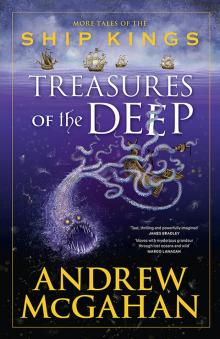 Treasures of the Deep
Treasures of the Deep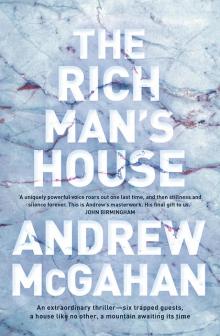 The Rich Man’s House
The Rich Man’s House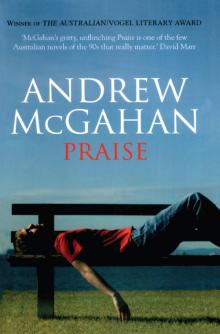 Praise
Praise The White Earth
The White Earth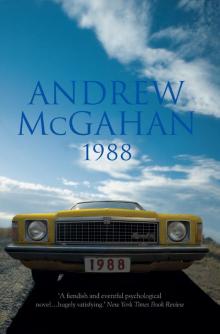 1988
1988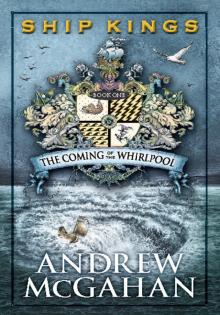 The Coming of the Whirlpool
The Coming of the Whirlpool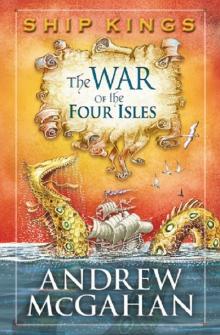 The War of the Four Isles
The War of the Four Isles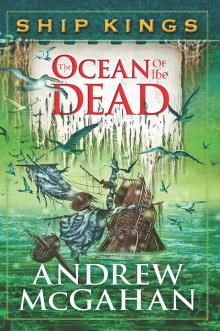 The Ocean of the Dead: Ship Kings 4
The Ocean of the Dead: Ship Kings 4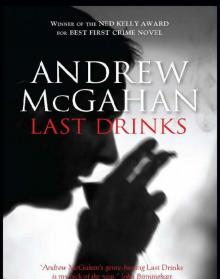 Last Drinks
Last Drinks Wonders of a Godless World
Wonders of a Godless World Underground
Underground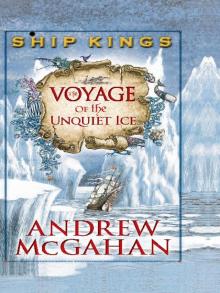 The Voyage of the Unquiet Ice
The Voyage of the Unquiet Ice